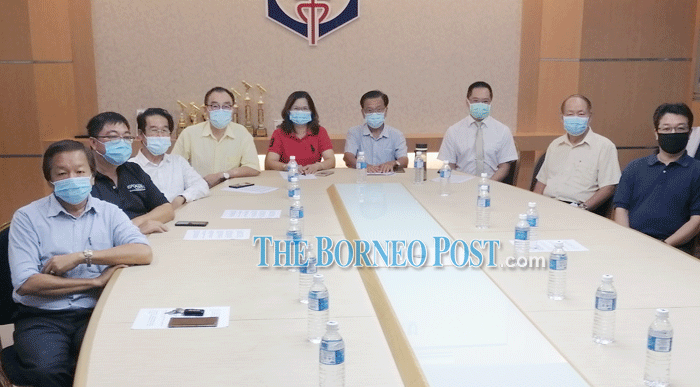
Ching Yong (fourth left), Teo (sixth left) and Dr Wong (seventh left) seen at the press conference.
SIBU: Malaysian Medical Association chairman Dr Wong Chya Wei has once again called for Sarawakians and Sabahans to be given the opportunity to be trained as medical specialists in whatever disciplines that they are eyeing for.
He says once they are trained, the likelihood for them to stay back to serve the local population is much higher.
“So I again urge the Ministry of Health (MoH) to look seriously into this particular issue, so that more Sarawakians and Sabahans would be accepted into the system for training purposes in order to improve the medical services within these two states,” he told reporters after conducting a meeting with the United Chinese Association (UCA) yesterday.
Those attending included Sarawak United People’s Party (SUPP) Dudong branch chairman Wong Ching Yong and UCA Special Task Unit for Full Accreditation of Medical Degrees in China Committee chairman, Teo Kin Hin.
Dr Wong said it was widely known that the number of medical doctors in Malaysia had reached an international ratio of about one doctor to 550.
“However, we are still in severe shortage of specialists doctors.”
Over the years, he said, professional training in Malaysia public univerisities had slowly increased the number of specialists.
“Unfortunately, it is still not enough if we look at the per capital population.”
He said the situation was especially acute in Sabah and Sarawak as all the larger hospitals in Peninsular Malaysia had been filled up by sufficient number of medical specialists in various disciplines.
“In Sarawak, however, apart from the major urban centres such as Kuching, Sibu, Bintulu and Miri, all the other district hospitals such those in Kapit, Lawas and even Sarikei, are still short of medical specialists in various disciplines.”
He said theMoH had posted specialists to Sabah and Sarawak, but those assigned would find ways to not come because Sabah and Sarawak were not their ‘home towns’.
“They find it difficult to uproot themselves and come over, which is understandable.”
Dr Wong said they would only work for a short period, usually two years of rotation – meaning they would come here, serve for two years and after that, apply
to go back to their hometowns.
“So it makes the shortage of medical specialists a very chronic problem in Sabah and Sarawak.”
Earlier, Teo voiced out UCA support for the proposal by SUPP president Dato Dr Sim Kui Kian to form Sarawak Medical Council (SMC) as a separate body to register and regulate medical practices in the state.
Dr Sim had suggested that SMC should be formed so that medical problems in Sarawak could be solved.
“We fully support the formation of SMC because it would not only help resolve the problems regarding the posting
of the doctors, but would also help retain medical human resources in Sarawak,” he added.
